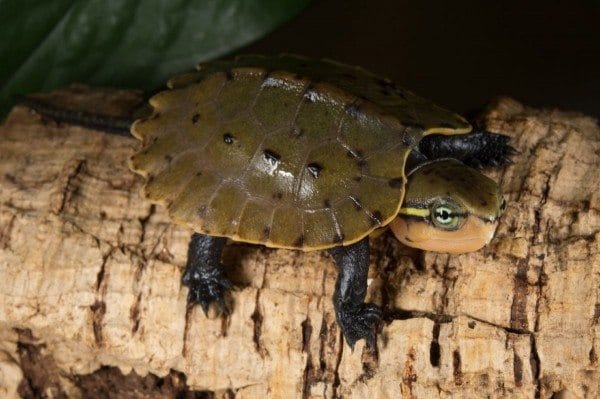Big-Headed Turtles Make Prospect Park Zoo Debut


They may not be as cute as red pandas or lambs, but the Prospect Park Zoo’s newest babies are still pretty impressive — the five Chinese big-headed turtles (Platysternon megacephalum) that hatched in November are the first ones of their species to have been successfully reproduced at a zoo accredited by the Association of Zoos and Aquariums.

The Prospect Park Zoo says it’s breeding this species as part of Wildlife Conservation Society’s global effort to save critically endangered turtles from extinction. The WCS now has 15 Chinese big-headed turtles at the Bronx and Prospect Park Zoos — the largest collection of the species in any AZA-accredited zoo. The hatchlings and most adults are housed in off-exhibit areas of the zoos, but you can visit one adult female, who’s on exhibit at the Animals in Our Lives building at the Prospect Park Zoo.

The WCS reports that zoo experts were able to successfully recreate specific environmental and climatic conditions to encourage these turtles to get it on, which will help other organizations to propagate the species in the future. They say they also employed complex husbandry techniques — from room temperatures and lighting to timing — to promote breeding and successful incubation of the eggs.

The Chinese big-headed turtle, which is native to China, Cambodia, Laos, Myanmar, Thailand, and Vietnam, can grow to be about seven inches long, and it has a skull of solid bone that is so large in proportion to its body that it cannot be withdrawn into its shell for protection. The species is classified as endangered by the International Union for the Conservation of Nature — the WCS says their population is declining due to trade demand across its Asian range countries.
The Wildlife Conservation Society’s Prospect Park Zoo is located at 450 Flatbush Avenue in Prospect Park, and is open daily from 10am to 4:30pm. Admission is $8 for adults, $6 for seniors 65 and older, $5 for kids ages 3-12, and free for children under 3.
All photos by Julie Larsen Maher/Wildlife Conservation Society




